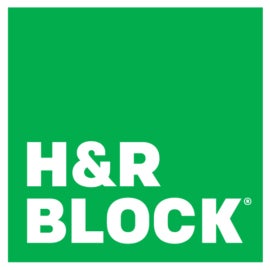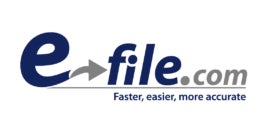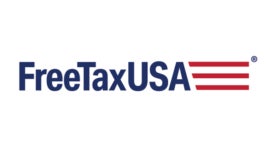- Best overall: TurboTax
- Easiest accountant collaboration: H&R Block
- Best for multi-state tax filing: eFile.com
- Best for bigger businesses: TaxAct
- Best free option: FreeTaxUSA
Filing taxes can be irritating enough for personal finances, but business taxes tend to be more complex, with more at risk in the event of an error and a greater chance of mistakes. So how you handle taxes may be a major concern, especially for organizations that don’t have dedicated tax accountants on staff and a limited budget to address the task.
That doesn’t mean you’re on your own, though. The right tools can help minimize risk and overhead, keep you compliant and reduce the overall difficulty and stress — so we’ve broken down the top five vendors of tax software for 2023.
Jump to:
- Top tax software comparison
- Top tax software
- Key features of tax software
- How do I choose the best tax software for my business?
- Methodology
Top tax software comparison
While we could list dozens of pertinent features and benefits that differentiate solutions in this particular niche of the financial space, we thought it best to keep it simple and target some of the biggest pain points felt by SMBs across nearly every industry.
Unlike so many SaaS categories for business users, tax software rarely, if ever, comes with freemium options or free trials (which, in this context, are usually reserved for personal tax filers). That said, there are enough options to accommodate different budgets and use cases.
| Starting price | Multi-state support | Expert support | Audit support | Full-service | ||
|---|---|---|---|---|---|---|
| TurboTax | $129 (pricing varies by included features) | Yes (add-on fee) | Yes (plan upgrade) | Yes | Yes (plan upgrade) | Try TurboTax |
| H&R Block | $89 + $19.95/state | Yes (add-on fee) | Yes (plan upgrade) | Yes | Yes (plan upgrade) | Try H&R Block |
| eFile.com | Federal: $20 State: $29.95 flat fee | Yes (flat fee) | Yes | No | No | Try eFile.com |
| TaxAct | $64.99 + $44.99/state | Yes (add-on fee) | Yes (add-on fee) | No | No | Try TaxAct |
| FreeTaxUSA | Federal: Free State: $14.99/state | Yes (add-on fee) | Yes (add-on fee) | No | No | Try FreeTaxUSA |
TurboTax: Best overall

Just as QuickBooks is the industry juggernaut for business accounting solutions, TurboTax has cornered much of the market for tax preparation and filing, both for personal filers and businesses.
It makes sense: Intuit is the parent company of both software tools, and they’ve designed these solutions to be as robust and comprehensive as possible. Such a deep feature set comes with an appropriately sized price tag, but it’s hard to dispute the value you get for the investment.
Pricing
Pricing for TurboTax is a little more complex than its offerings for personal finances. Pricing varies a lot more for businesses than for personal filers, ranging from software for contractors to full-service offerings for businesses. Business filers may be able to file for as little as $129 or as much as $1,499 (with additional fees for state filings). A number of factors can affect and increase this cost:
- One-time purchase vs. subscription.
- DIY vs. live assisted vs. full-service.
- Number of state filings, and whether those filings are e-file or not.
Features
- E-filing functionality for federal and nearly every state in the U.S.
- Live access to certified tax and accounting experts.
- Integration with other popular financial software apps.
- Mobile app support and downloadable software for on-prem hosting.
- Multiple options for receiving refunds (when applicable).
Pros
- Among the most robust tax suites available on the market.
- Integrates and interfaces with more apps, tax systems, etc. than almost any other software.
- Provides a measure of peace of mind regarding audit risks and tax compliance.
- Includes step-by-step assistance for those who need it, and full accounting functionality for those who don’t.
Cons
- Higher costs than most tax solutions.
- More complicated pricing than some competitors.
- Software that works best for businesses already using Intuit products.
H&R Block: Easiest accountant collaboration

Another heavyweight in the tax industry, H&R Block started as a tax preparation service provider before pivoting into digital filings. Much like TurboTax, H&R Block boasts impressive expert support, as well as full-service tax prep. What’s more, this software has offerings heavily tailored to businesses. Beyond that, those interested in “done for you” tax services can simply drop off the necessary documentation, and H&R Block handles the rest.
Pricing
Like TurboTax, pricing for H&R Block becomes more complex when used for businesses. That said, H&R Block does provide more transparency and clarity:
- For those filing their own taxes, the solution costs as little as $89 plus $19.95 per state (or $115 plus $49 per state if self-employed).
- For full-service tax prep, starting fees can be as high as $260.
Features
- Expertise at your disposal and at your convenience: File yourself with help or leave it to the pros.
- Separate options for self-employed professionals, S Corps, C Corps and partnerships.
- Audit prevention support.
- Year-round tax support.
Pros
- No accounting experience needed.
- Premium functionality at a lower price point than most enterprise-grade competitors.
- Full-service support, which makes filing as easy as dropping off a box full of the necessary paperwork.
Cons
- Higher costs than most tax solutions.
- May be more than some teams need.
- Multi-state filings quickly add to costs.
eFile.com: Best for multi-state tax filing

The recent shift to remote and decentralized teams has thrown a few additional wrenches into business financial processes. Running payroll across multiple states, for instance, can add significant complexity when accounting — and taxes are stressful enough already. eFile.com is a potential solution to some of these hurdles, adding simplicity and reducing difficulty for local organizations that have suddenly found themselves operating as a nationwide entity.
Pricing
While personal filers can leverage the Free Basic and Deluxe plans, self-employed professionals and business owners will need to use the Premier offering. However, you only pay after everything’s reviewed.
- Free Basic: $0.
- Deluxe: Starts at $29.
- Premier: Starts at $39.
Features
- Unlimited state filings for a flat fee.
- Free efile and re-efile.
- Low cost and low complexity.
Pros
- One flat fee for multi-state filings.
- Auto-downgrade feature prevents you from paying more than necessary should your filing qualify for a less expensive offering.
- Simple, straightforward functionality, keeping fees to a minimum.
Cons
- No dedicated offerings for business users (outside of self-employed options).
- Lack of more advanced support offered by other vendors in this list, making it less suitable for filers with minimal accounting expertise.
TaxAct: Best for bigger businesses

TaxAct is a middle ground between the enterprise-grade offerings of brands like Turbotax and more stripped-down tools like FreeTaxUSA (more on that vendor below). TaxAct offers expert support but not full-service tax prep, for one. For another, their software opts for a more simplistic aesthetic in the UI, in contrast to the very polished, stylized interfaces of the industry leaders.
What that leaves you with is a tool that brings just about everything to the table that the big names do but at a reduced price. You’re not totally on your own, but you’re also not paying for white-glove treatment either.
Pricing
- Sole proprietors: $64.99 plus $44.99 per state.
- Other businesses: $124.99 plus $54.99 per state.
Filers can also bundle and save by using TaxAct to file personal taxes alongside business taxes.
Features
- Separate offerings for sole proprietorships, tax-exempt organizations, partnerships, S Corps, C Corps and Estates & Trusts.
- Separate pricing options for online returns, online bundles and download bundles (for hosting the software on-prem).
- Expert assistance for an additional fee.
Pros
- Enterprise-grade functionality for around half the price.
- More flexibility and options for business filers.
- No need to pay for advanced support if you already have expertise at your disposal.
Cons
- Despite lower starting prices, there are both state and expert support charge add-on fees, with the former being per state.
- Less cost effective for multi-state filers, teams that need accounting support or those looking for extensive software integration.
FreeTaxUSA: Best free option

At the end of the day, sometimes all you really need is a low-cost, low-complexity tool to help you complete tasks you already handle regularly. In this case, that’s FreeTaxUSA.
It’s not especially tailored to business use cases and doesn’t offer expert support or full-service preparation. But not every team needs those features. For some, they just need a way to file electronically that keeps the overhead as low as possible. And for those users, FreeTaxUSA delivers exactly what they’re looking for.
Pricing
- Free to file federal for basic, premium and self-employed.
- Everything else costs extra, including a $14.99 per-state fee.
Features
- Free federal filing.
- Add-on options for state returns, audit defense, expert support, live tax specialist chat, etc.
- Least expensive vendor in this list, even with regard to add-on fees for state filings, “pay with return” fees, etc.
Pros
- Simple, inexpensive tax filing — likely as close to free as you’ll find.
- Available add-ons that make bonus functionality accessible if needed for a moderate additional cost.
Cons
- Like the other solutions in this list, it’s not truly free, despite the name.
- Software and support are less robust than the premium grade options higher in this list.
Key features of tax software
As mentioned above, there are plenty of features that come into play with software that facilitate important business processes like these. That said, a few features and concerns are common pretty much across the board and can be confusing for anyone who hasn’t dealt much with this particular niche in the past.
Pricing transparency
If you haven’t already, you’ll likely find that the fee structure for tax preparation services is among the most opaque. Some vendors will go to great lengths to convince you of the low cost (or no cost) of their offerings, only to saddle you with numerous add-on fees at the end of the process.
Most of the time, any mention of “free” refers to federal filings, and then usually just a narrow subset of circumstances that qualify for that bargain. Everything else will be an added cost.
And while businesses tend to have an easier time paying for things like this than personal filers, that doesn’t mean that budgets are bottomless. Some smaller businesses may be working under the professional equivalent of hand-to-mouth finances, and unpredictable costs can be a major concern.
That’s why it’s important to thoroughly vet vendors like these if price is a larger factor. Some will be upfront with their costs or make certain aspects of cost reduction blatant (like the flat fee for state filings). Others will try to hide some of the fees until the very end.
On the whole, though, you can usually expect to see fees, hidden or otherwise, for things like:
- Preparing state returns.
- Filing state returns.
- Paying for tax preparation via tax return proceeds.
- Receiving tax returns via direct deposit.
- Complex financial situations (self-employment, multi-state filings, investment profits, non-standard income sources, etc.).
Expert support
Not every business filer is in need of expert support when doing their taxes. Maybe the person filing is an accountant. Maybe they already have a tax guru on staff or on retainer. Maybe their situation is straightforward enough that they can pretty much handle it on their own. But not all teams are that lucky.
That’s one thing that can be said in favor of the more expensive vendors — they usually package their services with, or with the option to upgrade to, expert support. Even having someone you can jump into a chat with and ask a quick question can do wonders, both for the accuracy of the tax filing and for your peace of mind.
Audit protection
Tax audits are always a possibility, but they’re more likely for businesses than for most individuals. A lot of that is due to the complexity of business taxes, especially larger businesses or those across states.
There are two parts to avoiding audits: getting the information right to start and preparing the taxes properly. Many tax software titles offer some protection if something is missed, but the bigger the risks you’re dealing with, the more you’ll want to pay attention to the “how” and the “what” of any guarantee a vendor makes about this to make sure your bases are covered.
Amendments and refilings
Despite the best of efforts and the most extensive of expertise, sometimes there may be a flaw in what’s initially filed. Whatever the cause or situation, filing amendments and the like will be an inconvenience at best, even if it’s better than the alternative.
If this is something you’ve dealt with in the past or something you want to get ahead of in the future, look for vendors that make that process easier (as some will gate features like digital refilings behind add-on fees or upsells).
How do I choose the best tax software for my business?
When deciding on a business tax solution, two factors matter more than almost anything else: your available budget and the accounting expertise you currently have access to. If you have an on-staff tax pro, then expert support, full-service prep or other “value-add” features will be of little benefit.
On the other hand, if you lack access to CPA support on your end, or are otherwise constrained by budget limits, tools that bridge the gap between premium service and economy pricing will likely serve you best. Other than that, it’s all down to use case nuances.
Methodology
While writing this article, we researched the vendors and their websites, as well as customer reviews and ratings, to gain a full understanding of where each solution fits into the market landscape — and who they serve most effectively.


